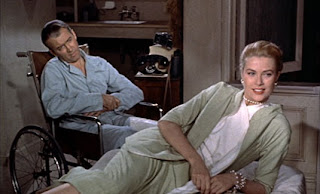
I was sitting out on my deck a few minutes ago, watching the sun set and escaping the heat. It's been hot in Seattle the last couple of days. The apartment building across the alley shows all the signs of a heat wave: windows and blinds open, someone installing an air conditioner, people wearing less than their usual amount of clothing, curtains blowing slowly in the tiny breeze.
Looking at those windows, I was struck by their resemblance to movie screens: rectangular, wider than they are tall, perfect frames to the little films going on inside. That I noticed that resemblance at all is a testament to Alfred Hitchcock's "Rear Window," a perfect summer movie that appeals to the voyeur in all of us.
 Hitchcock's film is set in the apartment of a New York news photographer (Jimmy Stewart) who is laid up with broken leg (notice how Hitchcock sets up that part of the story during the opening credits without a word of dialog). While Stewart waits for his leg to heal, he spies on his neighbors around the courtyard. Their windows are the shape of movie screens, each one framing a story, with Stewart and the audience filling in the details: the lusty newlyweds, a composer stuck writing a song, a lonely woman who may be pondering suicide, another young woman with too many men on her mind. And, of course, the battling couple across the way, the wife an invalid, the husband who may be planning a murder.
Hitchcock's film is set in the apartment of a New York news photographer (Jimmy Stewart) who is laid up with broken leg (notice how Hitchcock sets up that part of the story during the opening credits without a word of dialog). While Stewart waits for his leg to heal, he spies on his neighbors around the courtyard. Their windows are the shape of movie screens, each one framing a story, with Stewart and the audience filling in the details: the lusty newlyweds, a composer stuck writing a song, a lonely woman who may be pondering suicide, another young woman with too many men on her mind. And, of course, the battling couple across the way, the wife an invalid, the husband who may be planning a murder.It's a great set up and a terrific film, one of Hitchcock's best. There's romance (Grace Kelly as Stewart's girlfriend who refuses to believe that murder may be afoot), comedy (Thelma Ritter as the visiting nurse who may be more suspicious than Stewart), suspense and sheer terror. Hitchcock's direction, the set (at the time, one of the largest ever built) and the superb sound design capture the lazy, over-heated feeling of a humid summer night. Music and conversation drift in to Stewart's window ... and images, too. What is really going on in each apartment? What's the story? Did the man across the way really murder his wife? And, is it wrong to watch someone's life like this? When we go to the movies, are we watching art or just being high-class voyeurs?
The last time I saw "Rear Window" with an audience was several years ago at the Fremont Outdoor Cinema here in Seattle. Many people in the crowd hadn't seen the film before and it was great fun watching them watch the movie and be amused and scared by it for the first time. The climax had people squirming in their seats with suspense and applauding the ending with delight.
Hitchcock would have loved it.
At the end, Hitchcock tweaks our voyeurism just a bit: Most of the stories we thought we knew turn out differently than we expected. After all: We're just the audience, but it's his movie.

No comments:
Post a Comment